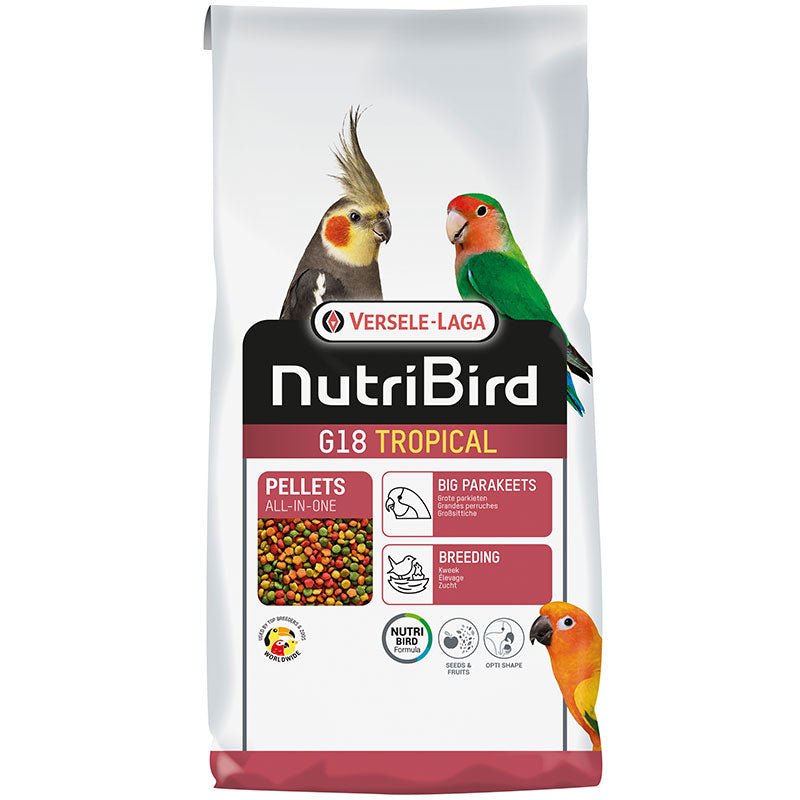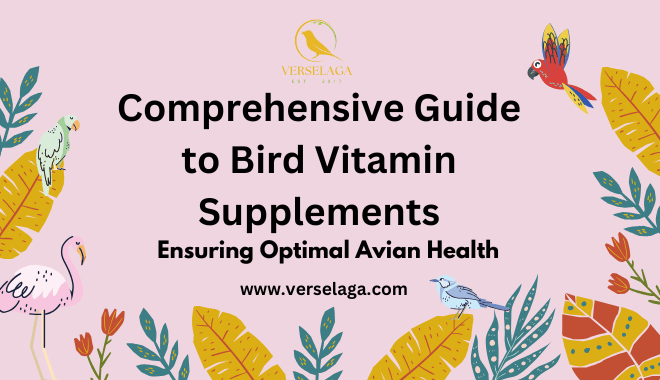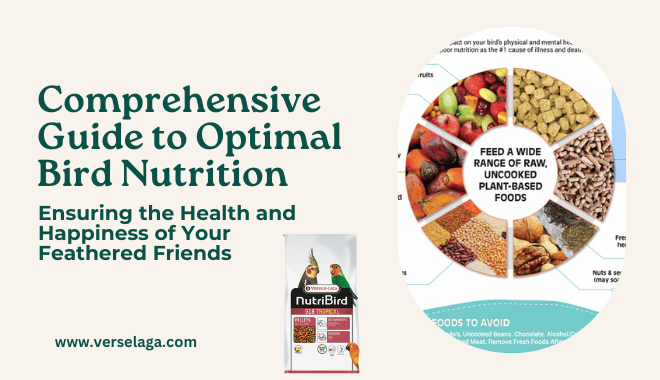The Best Foods for Parrots: A Comprehensive Guide to Nutritious Avian Diets
When it comes to feeding parrots, providing a balanced and nutritious diet is crucial for their health and happiness. Parrots are not…
When it comes to feeding parrots, providing a balanced and nutritious diet is crucial for their health and happiness. Parrots are not only vibrant and intelligent creatures but also have specific dietary requirements that need careful consideration. As an experienced SEO-focused content writer for verselaga.com, I am here to guide you through the essentials of what constitutes the best food for your feathered friends.

Understanding Parrot Nutrition: The Basics
Parrots, with their vibrant personalities and striking colors, are among the most popular pets worldwide. However, their dietary needs are as complex as their personalities. As a seasoned SEO-focused content writer specializing in avian care for verselaga.com, I’m here to guide you through the essentials of proper parrot nutrition. This comprehensive guide will not only deepen your understanding but also equip you with practical tips to ensure your parrot thrives.
The Importance of a Balanced Diet
A parrot’s diet is pivotal to its overall health, affecting everything from feather condition to life expectancy. Parrots are naturally omnivorous, and in the wild, they enjoy a varied diet consisting of fruits, vegetables, nuts, seeds, and occasionally insects and small animals. Mimicking this diet as closely as possible in a domestic setting is crucial for their physical and mental well-being.
Key Nutrients for Parrots
To maintain optimal health, your parrot’s diet must include a balance of the following nutrients:
- Proteins: Crucial for muscle and feather development. Sources include cooked lean meats, beans, pulses, and specialized avian pellets.
- Carbohydrates: Needed for energy. Good sources are fruits, vegetables, and whole grains like brown rice and barley.
- Fats: Essential for energy and supporting cell growth. Healthy fats can be found in seeds, nuts, and avocados (be cautious with the type of avocado, as some can be toxic to birds).
- Vitamins and Minerals: A variety of fruits and vegetables will help meet these needs, but sometimes supplements may be necessary, especially for Vitamin D and calcium, which are crucial for bone health.
The Role of Pellets in a Parrot’s Diet
Pellets are formulated to provide a comprehensive nutritional profile that includes vitamins, minerals, and other essential nutrients, making them an excellent base for your parrot’s diet. However, pellets should not be the sole component. They are best used in conjunction with fresh produce to ensure dietary variety and enrichment.
- Choosing the Right Pellets: Look for high-quality pellets that are appropriate for the type of parrot you own. Avoid products with artificial colors, flavors, or preservatives. [Internal link to pellet selection guide on verselaga.com]
Incorporating Fresh Foods
Fresh fruits and vegetables not only provide essential nutrients but also environmental enrichment that keeps your parrot engaged and happy. Here are some tips for incorporating these into your parrot’s diet:
- Safe Fruits and Vegetables: Offer a variety of colors and types, such as leafy greens, carrots, apples, and berries. Ensure all produce is thoroughly washed to remove pesticides.
- Preparation Tips: Chop fruits and vegetables into manageable pieces that your parrot can easily eat. This also helps prevent waste.
Supplements: Do Parrots Need Them?
While a well-rounded diet should provide most of the necessary nutrients, certain situations may require supplements. For example, if a veterinarian diagnoses your parrot with a deficiency, they may recommend specific supplements. Always consult with a professional before starting any supplement regimen to avoid over-supplementation, which can be harmful.
Monitoring Your Parrot’s Health Through Diet
Regularly observing your parrot’s eating habits and physical health can provide insights into the effectiveness of its diet. Changes in weight, feather quality, and energy levels can all indicate whether dietary adjustments are needed.
- Weight Management: Keep a regular check on your parrot’s weight. Sudden weight gain or loss can signify dietary imbalances or health issues.
- Feather and Skin Health: A nutritious diet reflects in the quality of your parrot’s feathers and skin. Dull feathers and flaky skin might suggest nutritional deficiencies.
A Foundation for Health
Proper nutrition forms the cornerstone of your parrot’s health and longevity. By understanding and implementing the basics of parrot nutrition, you can ensure that your colorful companion not only survives but thrives. For more detailed information on feeding specific parrot species, check out our in-depth resources [internal link to specific parrot nutrition guides on verselaga.com]. Remember, each parrot is unique, and their dietary needs can vary significantly based on species, age, and health status. Engage with a community of fellow parrot enthusiasts and experts to share insights and tips, ensuring your approach to parrot care is as informed and effective as possible.
High-Quality Pellets: The Foundation of a Parrot’s Diet
When it comes to maintaining the health and happiness of your parrot, nothing is more crucial than their diet. Parrots, with their lively personalities and complex nutritional needs, require a balanced and varied diet to thrive. Among the most important components of this diet are high-quality pellets. These pellets aren’t just another food item; they are crafted to meet the diverse nutritional requirements of parrots, serving as a cornerstone of their daily intake. In this comprehensive guide, we will explore why pellets are essential, how to choose the right ones, and how they fit into the broader dietary needs of your beloved bird.
Understanding the Role of Pellets in a Parrot’s Diet
Pellets are formulated to provide a complete nutritional balance, containing proteins, carbohydrates, essential fats, vitamins, and minerals that parrots need. Unlike a diet consisting solely of seeds and fruits, which can lead to nutritional imbalances, pellets offer a consistent and balanced alternative. They ensure that your parrot isn’t just picking out their favorite bits and potentially missing out on crucial nutrients.
- Nutritional Completeness: Pellets are scientifically developed to meet all the dietary needs of parrots, which can help prevent common health issues related to deficiencies.
- Convenience: Using pellets can simplify feeding routines, ensuring that parrots get a well-rounded diet without the need for excessive meal planning.
Choosing the Right Pellets
Selecting the appropriate pellets is vital for your parrot’s health. Here’s what you need to consider when choosing pellets:
- Species-Specific Formulas: Different species of parrots have varying nutritional requirements. Look for pellets that are tailored to the specific type of parrot you own, whether it’s an African Grey, Macaw, or Cockatiel.
- High-Quality Ingredients: Check the ingredients list for natural and wholesome components. Avoid pellets with artificial colors, flavors, or preservatives, which can be harmful to your bird’s health.
- Age and Health Considerations: Some pellets are formulated for different life stages or specific health needs, such as low-fat options for overweight birds or high-energy formulas for very active parrots.
Integrating Pellets with Other Foods
While pellets form a crucial foundation for a parrot’s diet, they should be part of a broader, varied nutritional plan that includes fresh fruits, vegetables, and appropriate treats. This variety not only ensures a wider range of nutrients but also keeps mealtime interesting for your parrot, helping to stimulate their mind and prevent boredom.
- Fresh Produce: Incorporate a selection of safe, washed fruits and vegetables daily. These not only provide essential vitamins and minerals but also offer hydration and different textures for mental stimulation.
- Protein Sources: Offer cooked eggs, lean meats, or fish occasionally to give your parrot a protein boost, especially important for larger or more active parrots.
Monitoring and Adjusting
Feeding your parrot a pellet-based diet isn’t a set-and-forget solution. Continuous monitoring and occasional adjustments are necessary to ensure it remains suited to their changing dietary needs.
- Observe Your Parrot’s Health: Regular check-ups with an avian vet, along with monitoring weight, feather condition, and overall activity levels, can help you determine if your parrot’s diet needs tweaking.
- Feedback from Your Parrot: Parrots are communicative; they often show preferences or dislikes. Observing how they interact with their food can provide insights into what might need to be adjusted.
Pellets as a Pillar of Parrot Nutrition
In conclusion, high-quality pellets are an indispensable part of a balanced parrot diet. They provide a foundation of essential nutrients that are difficult to replicate with homemade meals. However, remember that variety is the spice of life—even for parrots. Integrating pellets with fresh foods, monitoring your parrot’s health, and adjusting their diet as needed will help ensure that your feathered friend remains healthy, happy, and vibrant.
For more detailed guidance on parrot care and specific pellet recommendations, visit our product review and care advice sections at verselaga.com. Here you’ll find expert insights and high-quality products designed to meet the unique needs of your parrot.
The Role of Fresh Foods in a Parrot’s Diet: A Vital Component for Optimal Health
As responsible parrot owners, we all strive to provide the best for our feathered friends, ensuring they not only survive but thrive under our care. A significant part of achieving this goal lies in their diet, where fresh foods play an indispensable role. At verselaga.com, we understand the importance of incorporating fresh fruits and vegetables into your parrot’s daily routine. This article delves deep into why fresh foods are crucial, how they benefit your parrot, and the best ways to integrate them into their diet, all while maintaining a focus on readability, practical insights, and SEO optimization.
Why Fresh Foods Matter
Fresh foods are more than just supplements to a parrot’s diet; they are a cornerstone of their nutritional health. They provide essential vitamins, minerals, and enzymes that are often lost in processed foods. These nutrients are crucial for various bodily functions, including digestion, skin health, and feather strength.
- Vitamins and Minerals: Fresh fruits and vegetables are rich sources of natural vitamins such as A, C, and K, which help support immune functions and vision, among other health benefits.
- Hydration: Fresh foods have high water content, which helps keep your parrot hydrated, aiding in digestion and preventing kidney diseases.
- Enzymes and Antioxidants: Raw fruits and vegetables contain natural enzymes and antioxidants that help in nutrient absorption and combat oxidative stress, respectively.
The Benefits of Fresh Foods
Integrating fresh foods into your parrot’s diet offers a multitude of benefits that contribute to their overall well-being:
- Enhanced Feather and Skin Health: Nutrients like vitamins A and E are crucial for maintaining healthy skin and vibrant feathers. Fresh greens and brightly colored fruits are excellent sources of these nutrients.
- Behavioral Enrichment: The act of foraging fresh foods can mimic a parrot’s natural feeding behaviors, providing mental stimulation and reducing boredom-related behaviors.
- Improved Digestive Health: The fiber in fresh produce helps regulate a parrot’s digestive system, preventing issues such as constipation and promoting overall gut health.
Best Practices for Incorporating Fresh Foods
While the benefits are clear, the effective integration of fresh foods into your parrot’s diet requires some know-how. Here are some actionable tips to help you get started:
- Variety is Key: Offer a wide range of fruits and vegetables to ensure a broad intake of nutrients. Include leafy greens, carrots, apples, and berries, each providing different essential nutrients.
- Proper Preparation: Wash all produce thoroughly to remove pesticides and cut them into appropriate sizes to prevent choking hazards.
- Moderation and Balance: Fresh foods should complement, not replace, the main diet of pellets and seeds. Typically, fresh fruits and vegetables should make up about 20-25% of a parrot’s total diet.
- Regular Rotation: Rotate the types of fresh foods offered to prevent dietary excesses and deficiencies, and to keep your parrot interested in their meals.
Monitoring and Adjustments
Observing how your parrot interacts with fresh foods and monitoring their health is crucial. Look for signs of improved vitality such as more vibrant feathers, active behavior, and consistent stool quality, which can indicate good health. Conversely, any negative changes should prompt a review and adjustment of their diet.
- Consult with Experts: Regular check-ups with an avian vet can provide professional insights into the specific needs of your parrot, helping tailor their diet more effectively.
Embracing Fresh Foods for a Happier, Healthier Parrot
Incorporating fresh foods into your parrot’s diet is undoubtedly beneficial, contributing significantly to their physical health and mental well-being. By implementing the tips provided and observing your parrot’s response, you can create a dynamic and nutritious diet that supports their overall health.
For more detailed guidance on specific types of fresh foods and creative ways to include them in your parrot’s diet, visit our comprehensive care guides at verselaga.com. Here, you’ll find a wealth of resources designed to help you provide the best care for your vibrant companion, ensuring they live a long, healthy, and joyful life.
Supplements for Parrots: Are They Necessary?
In the comprehensive care of parrots, diet stands out as a cornerstone of health. While a well-rounded diet typically provides all the necessary nutrients, there are circumstances where dietary supplements can play a crucial role. At verselaga.com, we understand the importance of informed decisions about supplementing your parrot’s diet. In this detailed exploration, we’ll dive into when supplements are beneficial, what types are available, and how to use them safely and effectively.
Understanding the Basics of Dietary Supplements for Parrots
Supplements are products designed to provide nutrients that may not be adequately consumed in a parrot’s daily diet. These can include vitamins, minerals, amino acids, and fatty acids. They are not a replacement for a balanced diet but are used to ensure that no nutritional gaps exist that could impact a parrot’s health.
When Are Supplements Necessary?
- Dietary Deficiencies: Not all parrot diets are created equal, and even with the best intentions, some might lack specific nutrients. Supplements can help fill these gaps.
- Health Conditions: Certain health issues might require additional nutrients. For example, a parrot with bone density issues might benefit from added calcium and vitamin D.
- Life Stages: Different life stages may require different nutritional strategies. Breeding birds, juveniles, or elderly parrots might have additional needs that can be supported by supplements.
- Recovery from Illness: During recovery, a parrot’s body might need extra nutrients to heal and regain strength.
Types of Supplements and Their Benefits
- Vitamin Supplements: Useful for preventing and correcting deficiencies. Vitamins A, D, E, and K are commonly supplemented.
- Mineral Supplements: Important for bone health, nerve function, and overall cellular processes. Calcium and phosphorus supplements are often considered for parrots, especially for those on seed-based diets that typically lack these minerals.
- Probiotics: These supplements support digestive health, helping maintain a healthy balance of gut bacteria, which is crucial for nutrient absorption and immune function.
- Omega Fatty Acids: Supplements like fish oil can enhance feather health and reduce inflammation.
How to Safely Integrate Supplements into Your Parrot’s Diet
- Consultation with an Avian Vet: Before starting any supplement regimen, it’s crucial to consult with an avian veterinarian. They can provide guidance based on your parrot’s specific health needs and dietary background.
- Follow Recommended Dosages: More is not always better. Adhering to the recommended dosages is crucial to avoid toxicity or imbalance.
- Choose High-Quality Products: Not all supplements are created equal. Look for products specifically designed for birds to ensure safety and efficacy. [Internal link to recommended products on verselaga.com]
- Monitor Your Parrot’s Response: Keep an eye on how your parrot responds to the supplements. Positive changes in energy levels, feather quality, and overall health can indicate successful integration.
Balancing Diet and Supplements for Optimal Health
In conclusion, while a balanced and varied diet should meet most of a parrot’s nutritional requirements, supplements can play a key role in specific situations such as health recovery, dietary deficiencies, or life stage transitions. They should be used thoughtfully and under veterinary supervision to ensure they contribute positively to your parrot’s health.
For more detailed guidance on parrot nutrition and the use of supplements, continue exploring verselaga.com, where you can find a wealth of resources designed to help you provide the best care for your feathered companion. Remember, each parrot is unique, and their needs can vary widely, making tailored advice and high-quality products from trusted sources like verselaga.com invaluable.
Monitoring Your Parrot’s Diet
Regularly observing your parrot’s eating habits, along with periodic health check-ups, can help ensure that their dietary needs are being met. Changes in behavior or appearance can often indicate nutritional deficiencies or excesses.
Conclusion: A Balanced Diet for a Healthy Parrot
In conclusion, the best diet for your parrot is one that is balanced and varied. This should ideally include high-quality pellets, a range of fresh fruits and vegetables, some nuts and seeds, and appropriate whole grains. Remember, each parrot is unique, and their dietary needs can vary based on age, health, and lifestyle.
For more detailed information on parrot care and nutrition, visit our in-depth resources at Verselaga.com. Here, you’ll find expert advice and high-quality products designed to keep your parrot healthy and happy for years to come.


